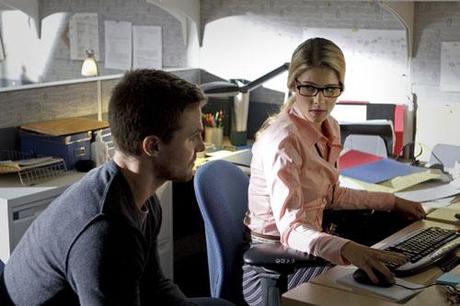Contributor: John Keegan
Written by Greg Berlanti, Andrew Kreisberg, and Marc Guggenheim
Directed by Guy Bee
It’s rather inconvenient when a less principled assassin comes along to cramp your vigilante style. Even when they shoot you with bullets laced in a poison that provides ample reason for useful narrative flashbacks, they can complicate your person mission of vengeance.

A lot of the negative comments for this episode have revolved around Deadshot’s appearance and treatment in “Arrow”. But I’m a relatively new reader of DC Comics, starting with the New 52, so I don’t see revisionism as a particularly major problem. It’s just a question of whether or not the character, as depicted, works within the context of the series. Making Deadshot a codename within Interpol files works well enough, and his operations work fine in a world where using archery is a viable option.
Bringing in Deadshot in this fashion is actually a case of perfect timing. The first two episodes made it clear that Oliver is not afraid to engage in some copious bloodletting, and killing in the name of justice is not that far a step away from killing for a contract, since Oliver’s sense of “justice” is largely a contract he wrote for himself. Setting up the boundaries of what Oliver will and will not do is important at this stage of the game, however, for the audience and the character both.
I love the idea that Dig is aware of Oliver’s alter-ego, especially in light of his criticisms earlier in the episode. Oliver’s decision to act the part of the overly-privileged rich boy meant that setting up a posh nightclub in the less fortunate part of town would be seen as incredibly crass and insensitive. But that’s the point; Oliver is not supposed to seem all that aware (or concerned) with his faults. By letting Dig see his true ambitions, he makes it clear that he’s not unaware of the perception issue.
I wonder if the writers intentionally had Oliver so impatient with the relationship drama that everyone was dumping on him throughout the episode, perhaps as a dig at “Smallville”. It would be refreshing if that wasn’t the focus of the show, and if Oliver was so intent on his mission that such things were a nuisance to him. He could be bothered by Laurel being with his friend, but there is such a thing as priorities!
However, we did get to see another side of Laurel, and what a side it was! Perhaps I was wrong to say that Dinah Laurel Lance wasn’t anywhere close to pulling on the fishnets and kicking ass as Black Canary. She has some fierce fighting skills, and given her legal position and family legacy, more than enough opportunity to see what slips through the cracks. I still think it will be a while, but the writers can’t possibly name the character that and not be leading to the inevitable.
One of the other things I’m really enjoying about the series so far is the parallel storytelling. The flashbacks aren’t just a neat way to explain how Oliver knows how to deal with what he encounters during his mission; they allow the writers to tell the story of his development from spoiled weakling to capable warrior while still focusing on his actual activities as Green Arrow. It’s not taking long for the writers to settle into a strong approach for this series, and the results are evident on the screen.
Writing: 2/2
Acting: 2/2
Direction: 2/2
Style: 2/4
Final Score: 8/10

